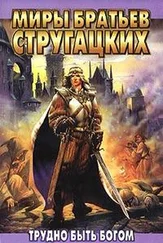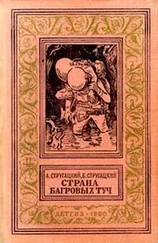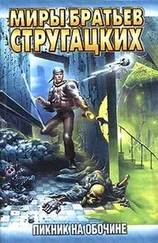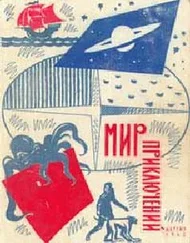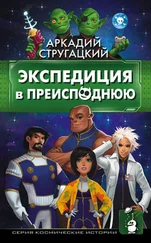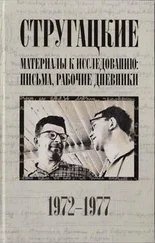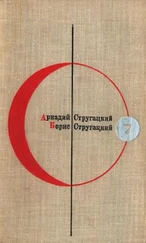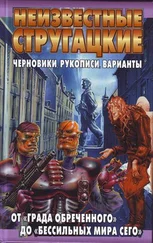Аркадий Стругацкий - Six Matches
Здесь есть возможность читать онлайн «Аркадий Стругацкий - Six Matches» весь текст электронной книги совершенно бесплатно (целиком полную версию без сокращений). В некоторых случаях можно слушать аудио, скачать через торрент в формате fb2 и присутствует краткое содержание. Жанр: Фантастика и фэнтези, на английском языке. Описание произведения, (предисловие) а так же отзывы посетителей доступны на портале библиотеки ЛибКат.
- Название:Six Matches
- Автор:
- Жанр:
- Год:неизвестен
- ISBN:нет данных
- Рейтинг книги:4 / 5. Голосов: 1
-
Избранное:Добавить в избранное
- Отзывы:
-
Ваша оценка:
- 80
- 1
- 2
- 3
- 4
- 5
Six Matches: краткое содержание, описание и аннотация
Предлагаем к чтению аннотацию, описание, краткое содержание или предисловие (зависит от того, что написал сам автор книги «Six Matches»). Если вы не нашли необходимую информацию о книге — напишите в комментариях, мы постараемся отыскать её.
Six Matches — читать онлайн бесплатно полную книгу (весь текст) целиком
Ниже представлен текст книги, разбитый по страницам. Система сохранения места последней прочитанной страницы, позволяет с удобством читать онлайн бесплатно книгу «Six Matches», без необходимости каждый раз заново искать на чём Вы остановились. Поставьте закладку, и сможете в любой момент перейти на страницу, на которой закончили чтение.
Интервал:
Закладка:
Arkady Strugatsky, Boris Strugatsky
Six Matches
From "MORE SOVIET SCIENCE FICTION" book
COLLIER BOOKS © 1962
The Crowell-Collier Publishing company
Translated from the Russian by R. Prokofieva
The Inspector laid aside his notebook.
"This is a very strange business, Comrade Leman. Very strange indeed."
"Do you think so?" said the Director of the institute.
"Don't you?"
"No, I don't. I think everything is perfectly clear."
The Director spoke drily, staring out of the window at the empty sun-flooded square. His neck had been aching for some time, and there was nothing of any interest on the square, yet he stubbornly kept his face averted. It was a kind of mute protest. The Director was young and inclined to be touchy. He knew quite well what the Inspector meant, but he did not think the Inspector had any right to harp on that particular aspect of the affair. The man's quiet insistence irritated him. "Why can't he leave well enough alone?" he thought in annoyance. "It's all as clear as daylight."
"It's not all clear to me," said the Inspector.
The Director shrugged his shoulders. He glanced at his watch and rose.
"Excuse me, Comrade Rybnikov," he said. "I have a class in five minutes. I'd better be going if you don't need me."
"Go ahead, Comrade Leman. I should like to see that, er... that 'personal laboratory assistant.' Gorchinsky is the name, I believe?"
"Yes, Gorchinsky. He hasn't come back yet. He will be told to see you as soon as he comes."
The Director nodded and withdrew. The Inspector looked after him with a quizzical expression on his face. "A little too cocksure, my friend," he said to himself. "Never mind. I'll get around to you eventually."
But the Director's turn hadn't come yet. There were more important things to be attended to first. On the face of it everything really did seem to be quite clear. Inspector Rybnikov of the Labour Protection Board could have written up his report on the "Case of Andrei Andreyevich Komlin, chief of the physics laboratory of the Central Brain Institute" without further delay. Andrei Komlin had performed some dangerous experiments on himself and had been rushed to hospital three days before where he still lay in a semi-delirious condition, his shaven head covered with some mysterious ringed bruises. He had lost the power of speech, was being treated with diverse stimulants and all that the doctors could say at this stage was that it was a case of extreme nervous exhaustion, which had affected the memory, speech and hearing centres.
As far as the Labour Protection Board was concerned this was an open-and-shut case. It was not a matter of machines or apparatus being out of order, or of carelessness or incompetence on anyone's part. There had been no violation of safety rules, at least not in the generally accepted sense. It was obvious too that Komlin had performed the experiments on himself in secret, and that no one at the institute had known anything about it, not even Alexander Gorchinsky, his "personal" laboratory assistant -although some of the other laboratory workers were of a different opinion on that score.
The Inspector was interested in another angle of the affair. A former research worker himself, Rybnikov sensed that behind the odd bits of information he had elicited concerning Komlin's work and this mysterious accident of his there lay some extraordinary scientific discovery. And the more he thought about it die more convinced he became that this was so.
Three months before the accident the laboratory had received a new apparatus: a neutrino beam generator. It was the advent of the generator in the physics laboratory that had set off the chain of events which, owing to what the Inspector considered downright negligence on the part of those concerned, had finally led to disaster.
Soon after the arrival of the generator, Komlin had turned over all his current work to his deputy and had shut himself up in the room where the new apparatus stood, announcing his intention to prepare a series of preliminary experiments. This went on for several days, at the end of which time Komlin reappeared, made his usual round of the laboratory, gave three staff members a dressing-down, signed some papers and ordered his deputy to get busy with the semi-annual report. The following day he locked himself up with the generator again, this time taking Alexander Gorchinsky with him.
What they did there came to light only two days before the accident, when Komlin had delivered a sensational report on neutrino acupuncture that had "shaken the foundations of medical science." But in the course of his three months' work with the generator Komlin had attracted the attention of his institute colleagues on three different occasions.
The first was when he turned up one fine day with his hair shaved off and a small black skull cap perched on his bald pate. That fact alone might have passed unnoticed had it not been for the peculiar behaviour of Gorchinsky that same morning. An hour after he and his chief had locked themselves in their laboratory, he came dashing out of the room, pale and dishevelled and rushed over wildly to the laboratory medicine chest. With trembling fingers he seized a few first-aid kits and dashed back to the generator chamber slamming the door behind him. Before the door closed, however, someone had caught a glimpse of Komlin by the window, clutching his left hand which was smeared with something that looked like blood. That evening Komlin and Gorchinsky had slipped quietly out of the neutrino chamber and hurried out of the laboratory without a word to anyone. Both seemed extremely depressed, and Komlin's left hand was bound in a soiled bandage.
The next curious thing happened a month later. One evening a junior member of the staff named Vedeneyev met Komlin in a secluded corner of the Blue Park. Komlin was seated on a park bench with a thick and dog-eared volume on his knees, staring before him and muttering under his breath. Vedeneyev wished him a good evening and sat down beside him. Komlin ceased his mutterings at once and turned to him, his neck sticking out strangely. His eyes, according to Vedeneyev, had what he described as a "murky look" and the young man had a strong desire to get up and go at once. But since that did not seem the polite thing to do, he tried to make conversation.
"Reading, Andrei Andreyevich?" he inquired.
"Yes," said Komlin. "Shih Nai-ang, River Backwaters. Most interesting. Take this, for instance..."
Vedeneyev was too young to know much about the Chinese classics and he felt even more uncomfortable than before. But Komlin suddenly closed the book with a bang, handed it to Vedeneyev and asked him to open it at random. Slightly embarrassed, Vedeneyev obeyed. Komlin glanced at the page ("once, and only for a moment"), and nodded.
"Now follow the text," he said.
And in his clear, distinct voice he proceeded to tell how one Hu Yang-cho, brandishing his sabre pounced on Ho Cheng and Se Pao, and how the "short-clawed tiger" Wang Ying and his wife "The Green Lady"... At that point Vedeneyev realized that Komlin was reciting the text from memory. He did not miss a single line, he did not stumble over a single name. He recited the entire page, word for word, letter for letter. When he came to the end, he asked:
"Any mistakes?"
Speechless with amazement, Vedeneyev shook his head. Komlin laughed, picked up the book and walked off. Vedeneyev did not know what to think. When he related the incident to his comrades they advised him to ask Komlin himself for an explanation. But when Vedeneyev made some remark to Komlin about that meeting in the park, the latter seemed so genuinely amazed and puzzled that Vedeneyev dropped the subject.
But even more odd was what had happened a few hours before the fatal accident.
Читать дальшеИнтервал:
Закладка:
Похожие книги на «Six Matches»
Представляем Вашему вниманию похожие книги на «Six Matches» списком для выбора. Мы отобрали схожую по названию и смыслу литературу в надежде предоставить читателям больше вариантов отыскать новые, интересные, ещё непрочитанные произведения.
Обсуждение, отзывы о книге «Six Matches» и просто собственные мнения читателей. Оставьте ваши комментарии, напишите, что Вы думаете о произведении, его смысле или главных героях. Укажите что конкретно понравилось, а что нет, и почему Вы так считаете.

